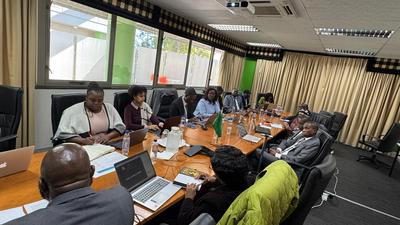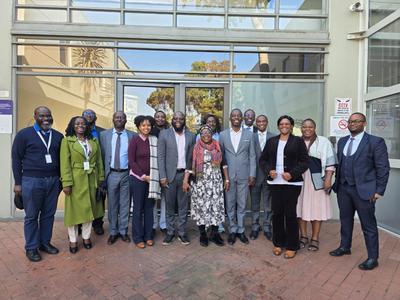Towards a Regulatory Model for Food Safety and Mycotoxin Control under the UP-RISE Project
13 November 2025
The African Union Development Agency (AUDA-NEPAD), in collaboration with UP-RISE Consortium and national partners, convened the Continental Validation Workshop on Country Situational Analyses (SITANs) in May 2025 in Johannesburg, South Africa.
The workshop brought together representatives from Benin, Kenya, Nigeria, and South Africa, alongside regional experts, African Union agencies, academia, and private sector stakeholders, to validate draft SITANs and chart a path toward a harmonised and inclusive regulatory model for food safety and mycotoxin control in Africa.
Key Objectives and Discussions:
- Validate draft Country SITANs and consolidate shared findings across participating countries.
- Harmonise methodologies, data analysis, and reporting frameworks to enable comparative insights and continental-level strategic planning.
- Promote regulatory approaches that are evidence-based, inclusive, and adapted to local realities.
Highlights and Insights:
- Country teams presented draft SITANs, identifying common challenges such as institutional fragmentation, weak enforcement in informal markets, and limited laboratory testing capacity.
- Ghana shared innovative informal market regulation practices, including progressive licensing and inter-agency vendor registration, offering practical models for engagement with informal actors.
- Participants endorsed a phased approach for developing the Continental Regulatory Model: co-development based on SITAN findings, validation through peer review, and piloting in Kenya and Benin before broader scale-up.
Quotes
Dr. Kokeb Tesfamariam, UP-RISE Scientific Coordinator, underlined the strategic importance of generating rigorous evidence through the SITAN process to inform sustainable food safety governance. He emphasised the need for regulatory models that reflect local realities, safeguard public health, and promote inclusive development.
Prof. Patrick Njobeh of University of Johannesburg highlighted the urgency of coordinated action to address fragmented food safety systems, noting that harmonised regulatory approaches are essential to mitigate mycotoxin risks and support health and trade goals.
Dr. Clement Adjoloro of AUDA-NEPAD reaffirmed the agency’s commitment to strengthening continental food safety systems and called for strong national ownership of SITAN findings. He stressed the importance of inter-agency coordination, evidence based policymaking, and continued technical engagement.
Ms. Kefilwe Moalosi of AUDA-NEPAD emphasised the importance of continued collaboration among stakeholders to achieve a harmonised and context-responsive regulatory model for food safety and mycotoxin control. She expressed appreciation to all participants for their active engagement and insightful contributions throughout the workshop, and extended gratitude to their respective Member States for prioritising this important agenda. She underscored that harmonisation efforts will require sustained commitment, mutual learning, and alignment with continental frameworks, and affirmed AUDA-NEPAD’s commitment to working with all partners to translate the validated SITAN findings into action.


